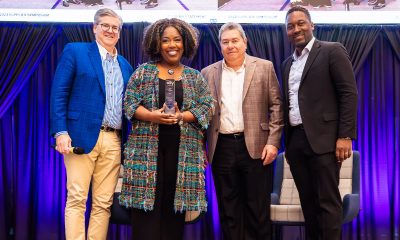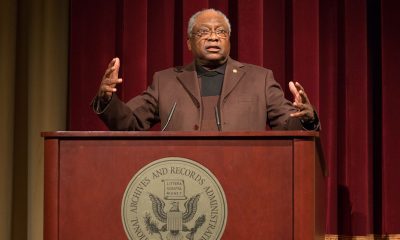Economics
God On Wall Street: Is There A Middle Class Breakdown? – Part 1
By Curtis O. Robinson, Sr.
“Behold, these are the wicked; and always at ease, they have increased in wealth.” Psalms 72:12
As the dollar continues to strengthen against the euro, I can hear the O’Jays in the back of my mind sing, “All Mighty Dollar.”
The dollar has made a significant comeback from the days when American tourist would be greeted by foreign exchange bankers with signs that read, “Euros Only.”
A euro is the official currency of the European Union’s (EU) member countries. The euro was introduced by the EU to the financial community in 1999, and physical euro coins and paper notes were introduced in 2002.
So as you can see, the euro is a new concept that allowed countries to pool their currency into a unit creating their standard of exchange. As of today one U.S. dollar can buy 0.79 euro.
This means that the dollar is being exchanged at a discount to the euro. I get less euros in exchange for U.S. dollars.
However, because of a recovery of positive Gross Domestic Product (GDP), the monetary value of all the finished goods and services produced in the U.S.), economic policy under the Obama administration has placed the country’s economic trajectory on an upward pace.
Or is it?
In his book, “No Rising Tide,” Joerg M. Rieger says, “There can be little doubt that the topic of class is among the most taboo in the United States.”
And we can see in our churches that the message about money is not correct because money is something that we just don’t talk about.
And I think that we suffer.
We suffer from an illusion of prosperity and wealth because in the African-American culture, wealth is not something that we build – it’s something that you wear.
When we look at the mirage of professional athletes in the U.S. who have reached the zenith of their athletic performance, as soon as many of them can, they cover themselves in jewelry, cars and clothing that are fit for a king.
It is a staggering summation when stats suggest that 78 percent of NFL players and 60 percent of NBA players file for bankruptcy within five years after retiring.
So money has an intoxicating effect because either we are wasting what we have or wasting money trying to look like what we are not.
In 2009, the 25 richest hedge fund investors earned $25 billion dollars. Entry into the super-rich club begins at $380,000 annually, while the average household income of the super-rich is $1.2 million annually.
 Is there a way out of the spiraling nightmare of money imbalance? And when will the church stop acting like Jesus doesn’t hear the groans of the oppressed?
Is there a way out of the spiraling nightmare of money imbalance? And when will the church stop acting like Jesus doesn’t hear the groans of the oppressed?
In terms of net worth of the middle class in the U.S., things haven’t improved since 1984 – they have worsened. Is there a solution?
Curtis O. Robinson, Sr. is senior pastor of Faith Baptist Church in Oakland and chairman of the board of Faith Visionary Services, Inc. of Oakland. Contact him at pastorcurt@thefaithbcofoakland.org.
Business
Black Business Summit Focuses on Equity, Access and Data
The California African American Chamber of Commerce hosted its second annual “State of the California African American Economy Summit,” with the aim of bolstering Black economic influence through education and fellowship. Held Jan. 24 to Jan. 25 at the Westin Los Angeles Airport Hotel, the convention brought together some of the most influential Black business leaders, policy makers and economic thinkers in the state. The discussions focused on a wide range of economic topics pertinent to California’s African American business community, including policy, government contracts, and equity, and more.

By Solomon O. Smith, California Black Media
The California African American Chamber of Commerce hosted its second annual “State of the California African American Economy Summit,” with the aim of bolstering Black economic influence through education and fellowship.
Held Jan. 24 to Jan. 25 at the Westin Los Angeles Airport Hotel, the convention brought together some of the most influential Black business leaders, policy makers and economic thinkers in the state. The discussions focused on a wide range of economic topics pertinent to California’s African American business community, including policy, government contracts, and equity, and more.
Toks Omishakin, Secretary of the California State Transportation Agency (CALSTA) was a guest at the event. He told attendees about his department’s efforts to increase access for Black business owners.
“One thing I’m taking away from this for sure is we’re going to have to do a better job of connecting through your chambers of all these opportunities of billions of dollars that are coming down the pike. I’m honestly disappointed that people don’t know, so we’ll do better,” said Omishakin.
Lueathel Seawood, the president of the African American Chamber of Commerce of San Joaquin County, expressed frustration with obtaining federal contracts for small businesses, and completing the process. She observed that once a small business was certified as DBE, a Disadvantaged Business Enterprises, there was little help getting to the next step.
Omishakin admitted there is more work to be done to help them complete the process and include them in upcoming projects. However, the high-speed rail system expansion by the California High-Speed Rail Authority has set a goal of 30% participation from small businesses — only 10 percent is set aside for DBE.
The importance of Diversity, Equity and Inclusion (DEI) in economics was reinforced during the “State of the California Economy” talk led by author and economist Julianne Malveaux, and Anthony Asadullah Samad, Executive Director of the Mervyn Dymally African American Political and Economic Institute (MDAAPEI) at California State University, Dominguez Hills.
Assaults on DEI disproportionately affect women of color and Black women, according to Malveaux. When asked what role the loss of DEI might serve in economics, she suggested a more sinister purpose.
“The genesis of all this is anti-blackness. So, your question about how this fits into the economy is economic exclusion, that essentially has been promoted as public policy,” said Malveaux.
The most anticipated speaker at the event was Janice Bryant Howroyd known affectionately to her peers as “JBH.” She is one of the first Black women to run and own a multi-billion-dollar company. Her company ActOne Group, is one of the largest, and most recognized, hiring, staffing and human resources firms in the world. She is the author of “Acting Up” and has a profile on Forbes.
Chairman of the board of directors of the California African American Chamber of Commerce, Timothy Alan Simon, a lawyer and the first Black Appointments Secretary in the Office of the Governor of California, moderated. They discussed the state of Black entrepreneurship in the country and Howroyd gave advice to other business owners.
“We look to inspire and educate,” said Howroyd. “Inspiration is great but when I’ve got people’s attention, I want to teach them something.”
Activism
Oakland Post: Week of April 17 – 23, 2024
The printed Weekly Edition of the Oakland Post: Week of April 17 – 23, 2024

To enlarge your view of this issue, use the slider, magnifying glass icon or full page icon in the lower right corner of the browser window. ![]()
Activism
Oakland Post: Week of April 10 – 16, 2024
The printed Weekly Edition of the Oakland Post: Week of April 10 – 16, 2024

To enlarge your view of this issue, use the slider, magnifying glass icon or full page icon in the lower right corner of the browser window. ![]()
-

 Activism4 weeks ago
Activism4 weeks agoOakland Post: Week of March 27 – April 2, 2024
-

 #NNPA BlackPress4 weeks ago
#NNPA BlackPress4 weeks agoCOMMENTARY: D.C. Crime Bill Fails to Address Root Causes of Violence and Incarceration
-

 #NNPA BlackPress4 weeks ago
#NNPA BlackPress4 weeks agoFrom Raids to Revelations: The Dark Turn in Sean ‘Diddy’ Combs’ Saga
-

 #NNPA BlackPress4 weeks ago
#NNPA BlackPress4 weeks agoCOMMENTARY: Lady Day and The Lights!
-

 #NNPA BlackPress4 weeks ago
#NNPA BlackPress4 weeks agoMayor, City Council President React to May 31 Closing of Birmingham-Southern College
-

 #NNPA BlackPress4 weeks ago
#NNPA BlackPress4 weeks agoBaltimore Key Bridge Catastrophe: A City’s Heartbreak and a Nation’s Alarm
-

 #NNPA BlackPress4 weeks ago
#NNPA BlackPress4 weeks agoBaltimore’s Key Bridge Struck by Ship, Collapses into Water
-

 #NNPA BlackPress4 weeks ago
#NNPA BlackPress4 weeks agoBeloved Actor and Activist Louis Cameron Gossett Jr. Dies at 87




















































